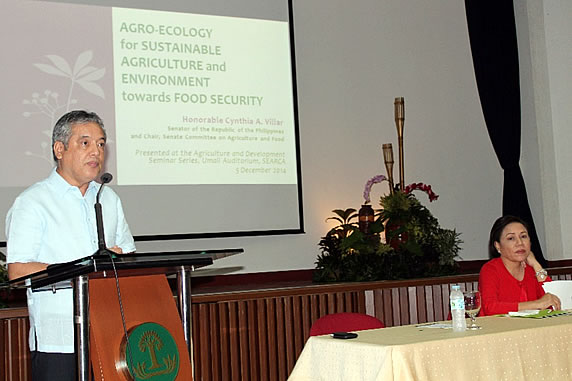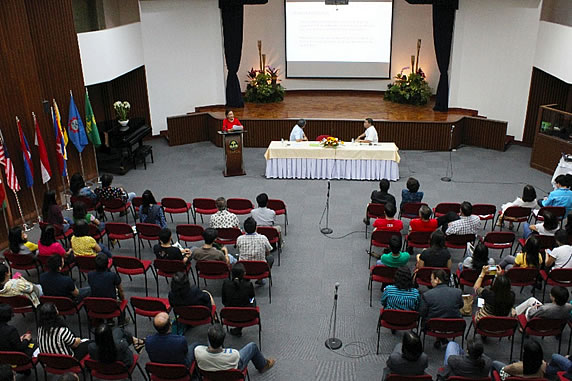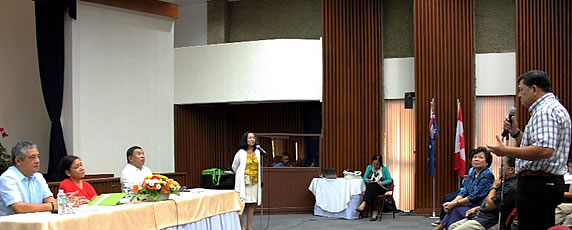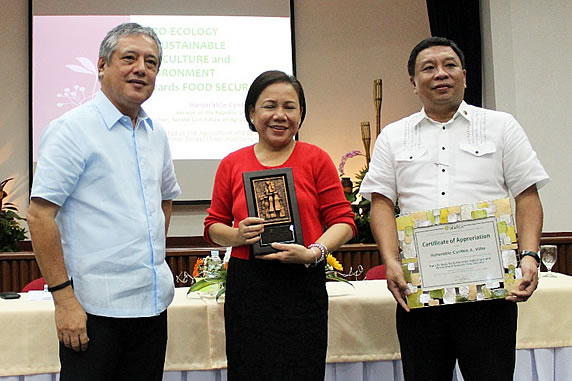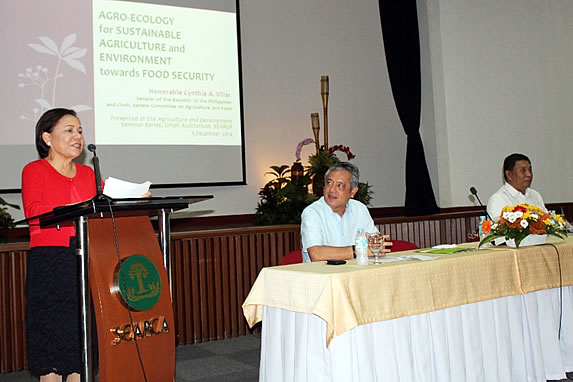Citing a recent report by Germanwatch at the United National Framework Convention on Climate Change in Peru that the Philippines was at the top of the list of countries most affected by climate changed in 2013, the Chairperson of the Philippine Senate Committee on Agriculture and Food said this is more reason to focus on agro-ecology since it provides environment-related benefits and aims for environmental sustainability.
She discussed these in her presentation on “Agro-ecology for Sustainable Agriculture and Environment towards Food Security” delivered at the Agriculture and Development Seminar Series (ADSS) of the Southeast Asian Regional Center for Graduate Study and Research in Agriculture (SEARCA) held on 5 December 2014 at SEARCA’s headquarters in Los Baños, Laguna, Philippines.
Agro-ecology, according to Laura Silici of the International Institute of Environment and Development (IIED), uses ecological concepts and principles to design and manage sustainable agro-ecosystems, offering benefits for productivity, food security, environmental sustainability, and important ecosystem services such as climate change mitigation.
In her seminar at SEARCA, Senator Villar echoed the statement of Food and Agriculture Organization of the United Nations (UN FAO) Director-General José Graziano da Silva that a paradigm shift in agriculture is needed.
Dr. Da Silva said the main challenge facing world farming is to lower the use of agricultural inputs, especially water and chemicals, as well as to make food production viable in the long-term. He pointed out that agro-ecology is really farming in a more sustainable way, and that sustainability is the key.
Senator Villar shared that Dr. Da Silva’s points were reiterated by Professor Hilal Elver, United Nations (UN) Special Rapporteur on the Right to Food, who noted that recent scientific researches increasingly prove how agro-ecology offers environmentally sustainable methods that meet the rapidly growing demand for food.
She said “ensuring food security is another factor that is of foremost consideration. And according to the FAO, only small farmers and agro-ecology can feed the world. It cites that 70% of food consumed globally comes from small farmers. Based on official statistics, 1.5 billion of people globally are estimated to be involved in family farming in over 500 million small farms worldwide.”
She added that many experts believe that agro-ecology is best suited for small-scale and family farmers, and so there is a need “to provide adequate incentives and technical assistance to support small-scale farmers as well as micro, small and medium-sized enterprises (MSMEs) in the creation of local ‘agro-ecological business models’ that can make appropriate inputs and technologies available to communities.”
Senator Villar talked about her organic fertilizer-making enterprise in her home city of Las Piñas in Metro Manila. “We build composting centers in all of our city’s barangays to convert kitchen and garden wastes into organic fertilizer that we distribute for free to farmers and vegetable gardeners,” she said, and pointed out that composting is in line with the National Organic Agriculture Program.
Furthermore, she stressed the need to train small farmers on entrepreneurship to enable them to appreciate farming more and not leave the rural areas in search of the proverbial "greener pasture."
To sum up, Senator Villar quoted an agro-ecology report: “The vision of agro-ecology combines the sciences of ecology and agronomy with the political economy of food production and consumption. This approach goes beyond improving the availability of food to also ensuring access and the achievement of the right to food. Indeed, it should be the standard by which national agricultural strategies, food security plans and foreign assistance programs are evaluated by their respective publics.”
The ADSS was attended by university students, professors, and researchers, as well as officials and staff of SEARCA, and government agencies and other development organizations in Los Baños. (Leah Lyn D. Domingo)
